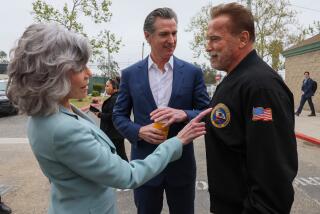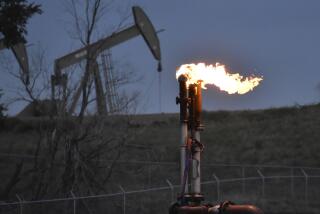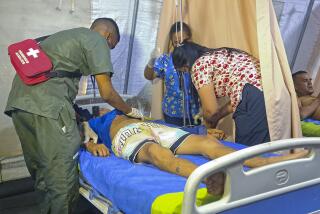Botswana accused of allowing fracking in national parks
JOHANNESBURG, South Africa – The government of Botswana has quietly allowed international companies to explore for natural gas in some of the country’s most sensitive national parks using the controversial drilling method of hydraulic fracturing, according to a new documentary released in South Africa.
American filmmaker Jeffrey Barbee obtained a government map that appears to show that authorities in Botswana allocated vast exploration concessions in the Central Kalahari Game Reserve, Kgalagadi Transfrontier National Park and Chobe National Park without a public debate about the possible environmental and health consequences.
After initially denying the claim, Botswana’s government last week admitted that some hydraulic fracturing -- known as fracking -- had taken place during coal-bed methane exploration.
“There are currently no fracking operations going on in the country except exploration drilling by various exploration companies,” the Ministry of Minerals, Energy and Water Resources said in statement.
Government spokesman Jeff Ramsay said prospecting licenses had been granted in many parts of Botswana, including in the Central Kalahari Game Reserve, but did not elaborate. He acknowledged that fracking had occurred in some areas in the past, but offered no details about when or where. He said authorities were adhering to environmental regulations.
Botswana runs Kgalagadi Transfrontier Park jointly with South Africa, but a spokesman for that country’s environment department had no knowledge of exploration concessions in the park.
Among the companies granted concessions are South African energy giant Sasol, whose spokesman told Barbee that the company was not required by Botswana to produce an environmental management plan, although it considers the practice worthwhile. Other companies include Anglo American, Tlou Energy, Exxaro, Kalahari Energy and Tamboran Resources.
Fracking involves shooting water infused with sand and chemicals at high pressure into coal beds or shale formations to unlock reservoirs of natural gas. The practice is the subject of intense debate in the United States and elsewhere, with activists citing methane leaks from gas well heads and possible contamination of the air and groundwater.
Barbee’s film, “The High Cost of Cheap Gas,” contends that natural gas extraction is “dirtier than the industry will admit.”
But for Southern African countries struggling to provide adequate affordable electricity to their populations, promises from energy companies of jobs, hefty returns and reduced dependence on coal-fired electricity are galvanizing. Botswana imports half its energy from neighboring countries.
“This [film] is for the people across the region to know what this industry might entail, so that they can take the best decision,” said Richard Lee, a spokesman for the Open Society Initiative for Southern Africa, a governance group that funded Barbee’s project.
Excerpts from the film were screened Sunday night on South Africa’s popular investigative news program, Carte Blanche.
Barbee, who now lives in Johannesburg, was exposed to fracking in his home county of Garfield, Colo. He said some of those who once supported fracking there now wish it had never come to Garfield.
When energy companies proposed fracking in Southern Africa, he decided to make a film -- a kind of letter from Garfield, one of America’s most intensively fracked areas, to southern Africans.
“Where I come from in Garfield, Colo., the gas industry came into the area with very little fanfare,” Barbee said in an interview Thursday. “Fifteen years later, we are left with an environmental problem in our valley so huge that we don’t yet understand what has been harmed and what has been lost.”
Barbee spoke to activists in Garfield and elsewhere and also interviewed experts from the University of Colorado who cast doubt on assertions of how clean natural gas extraction is, because of emissions and leaks from well heads.
A 2012 Colorado School of Public Health report cited “acute and chronic health problems for those living near natural gas drilling sites.” The study focused on toxic emissions in Garfield County from 2008 to 2010.
Drilling in Botswana’s national parks, where tens of thousands of elephants roam, is causing particular concern.
Barbee interviewed Botswana farmer Ben Moller, who said the elephants depend on clean water from bore holes along their migration route.
“These elephants bank on these bore holes. If it happens that these bore holes get contaminated, it will be a huge disaster for the elephants,” Moller said in the film.
Coal-bed methane extraction requires pumping large amounts of water out of the ground. The water can be clean, but can also be highly saline or radioactive, according to studies cited by the film.
“The industry says the water can be used for crops and animals. I don’t think that’s an accurate reflection of the American experience,” said the film’s producer, Mira Dutschke, at an advance screening in Johannesburg last week.
The extraction process can also cause the water table to drop by several yards, according to experts quoted in the film, a development that would be alarming in Botswana, a dry country with vast swaths of desert.
Botswana’s government released a statement in parliament last week saying the water supplies would be protected.
It described Barbee’s film as a “smear campaign” and called on lawmakers to “defend the sovereignty of our state.”
“This is not a smear campaign in any way,” Barbee said. “It’s a wake-up call to suggest let’s all have a discussion about whether this activity should occur, and where is it best for it to occur for the people of Botswana and for the wildlife they’re so famous for protecting.”
Barbee also worries about his adopted home, where Shell South Africa has proposed extensive fracking and gas extraction in the Karoo, a vast desert area in the country’s south. Shell, which is planning to invest about $1 billion in the development, says it is “the game-changing opportunity that South Africa needs.”
Shell South Africa’s chairman, Bonang Mohale, said last year that gas extracted through fracking could “address job creation, benefit the poor in South Africa, stimulate the economy and secure energy supply for South Africans.”
After controversy erupted in South Africa over the proposed Karoo project, the government introduced a moratorium on fracking in 2011. Although the country lifted a ban on fracking just over a year ago, the moratorium remains in place, the Business Day newspaper reported last month.
Also last month, the government proposed regulations on gas exploration that would govern fracking and called for public comment. Opponents of fracking are expected to take legal action to try to prevent it from going ahead.
Under the proposed regulations, the South African government could have up to a 50% stake in gas extraction operations.
Critics are skeptical of Shell’s claims that the poor will benefit from such projects. They argue that while jobs are required at the outset to build well infrastructure, these are transient functions typically performed by highly skilled outsiders.
“The riches of mining in Africa have never, ever been shown to trickle down to the people who have to live with the consequences of it,” Jonathan Deal, spokesman of the Treasure the Karoo Action Group, told Barbee.
ALSO:
Biden on delicate diplomacy mission after tension with China
Corruption worsens in world’s conflict areas, 2013 survey finds
North Korea’s No. 2 official may have been ousted, spy agency says
Twitter: @latimesdixon
More to Read
Start your day right
Sign up for Essential California for news, features and recommendations from the L.A. Times and beyond in your inbox six days a week.
You may occasionally receive promotional content from the Los Angeles Times.






